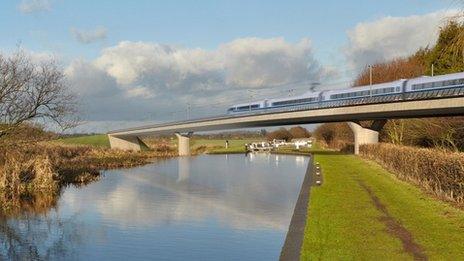On track to mega-status
- Published

Not everyone is as convinced as Prof Florida that HS2 is a good idea
Richard Florida is something of a celebrity academic - a watcher of the big trends that will shape the future economy and society.
His reach has seen him named as one of the world's top ten most influential thinkers.
And he reckons central Scotland has what it takes to be one of the world's 40 or so mega-regions.
It's got the population density, income generation, skills, universities and creativity.
What it also needs is a modern, fast rail network. The 20th century city sprawled with the motorcar, so further expansion will require high-speed trains.
This much I know from interviewing Professor Florida from his office at the Martin Prosperity Institute, part of the University of Toronto. You can hear it by listening to the Business Scotland programme in which we've taken a detailed look at the future of rail.
Leapfrog technology
In a week when plans for high-speed rail, or HS2, linking London with points north have taken something of a mauling from MPs and business critics, Prof Florida's is a more positive voice, siding with both the UK and Scottish governments.
He sees this as a "leapfrog technology", which can secure the future for these mega-regions, giving them an edge, and without which the wannabe metropolis may find itself struggling. He also stresses this is about both internal high-speed rail (linking up Scotland), and links between mega-regions (linking to London).
One response I've already read is that Scotland has no aspiration to be a mega-region, but a nation. That rather misses the point. The notion of mega-regions is to have economies cross international boundaries, as with the one Florida has identified between Barcelona and Lyon.
By this argument, the 21st century economy moves beyond the nation state. Indeed, that seems to be an important part of the Scottish National Party's economic vision, while it's the UK Treasury that has raised concerns about the costs of 'border effects'.
London calling
One of the bigger issues if Scotland is to be (or to remain?) an economic hub of global significance is how it interacts with London, which is a mega-region drawing in the Midlands and stretching north. Its boundaries, indeed, could be determined by those high-speed transport links.
The advice from Prof Florida, at 3,000 miles removed from the constitutional battle, is to embrace the opportunities from London - connect with it, feed off it, and benefit from the spillover effects as it overheats.
"Once you have one of the great hubs of the world economy, you should use it," he says.
And sure enough, London's property market is showing signs of overheating. Again.
On the buses
Another of the issues addressed in Business Scotland this week is worth recording. Douglas McNeill, investor manager and transport specialist at Charles Stanley, is among the doubters about HS2, saying it may have business benefits, but he's not hearing individual businesses talk up its importance to them.
He's also interesting in countering our impression that continental trains are much better run than Britain's.
I also asked him about two companies he watches closely, which give Scotland a big footprint in the corporate world of transport. Stagecoach, based in Perth, and FirstGroup, based in Aberdeen, have similar profiles across rail franchises, buses and US coach operations.
So when you compare them, how come their recent fortunes have been so contrasting, particularly on the buses?
Douglas McNeill says much of it goes back to FirstGroup's takeover of Laidlaw in the US, leaving it with management headaches and a lot of debt.
Without much less money, it's run a relatively old, inefficient and unreliable bus operation, which it is now trying to slim down by piecemeal sales.
The Aberdeen firm has also responded to rising fuel costs by raising its ticket prices.
By contrast, Stagecoach has had money to invest in renewing the fleet. It has responded to rising fuel bills by cutting its other costs, and it has been smarter about designing its route map to attract in new bus passengers.